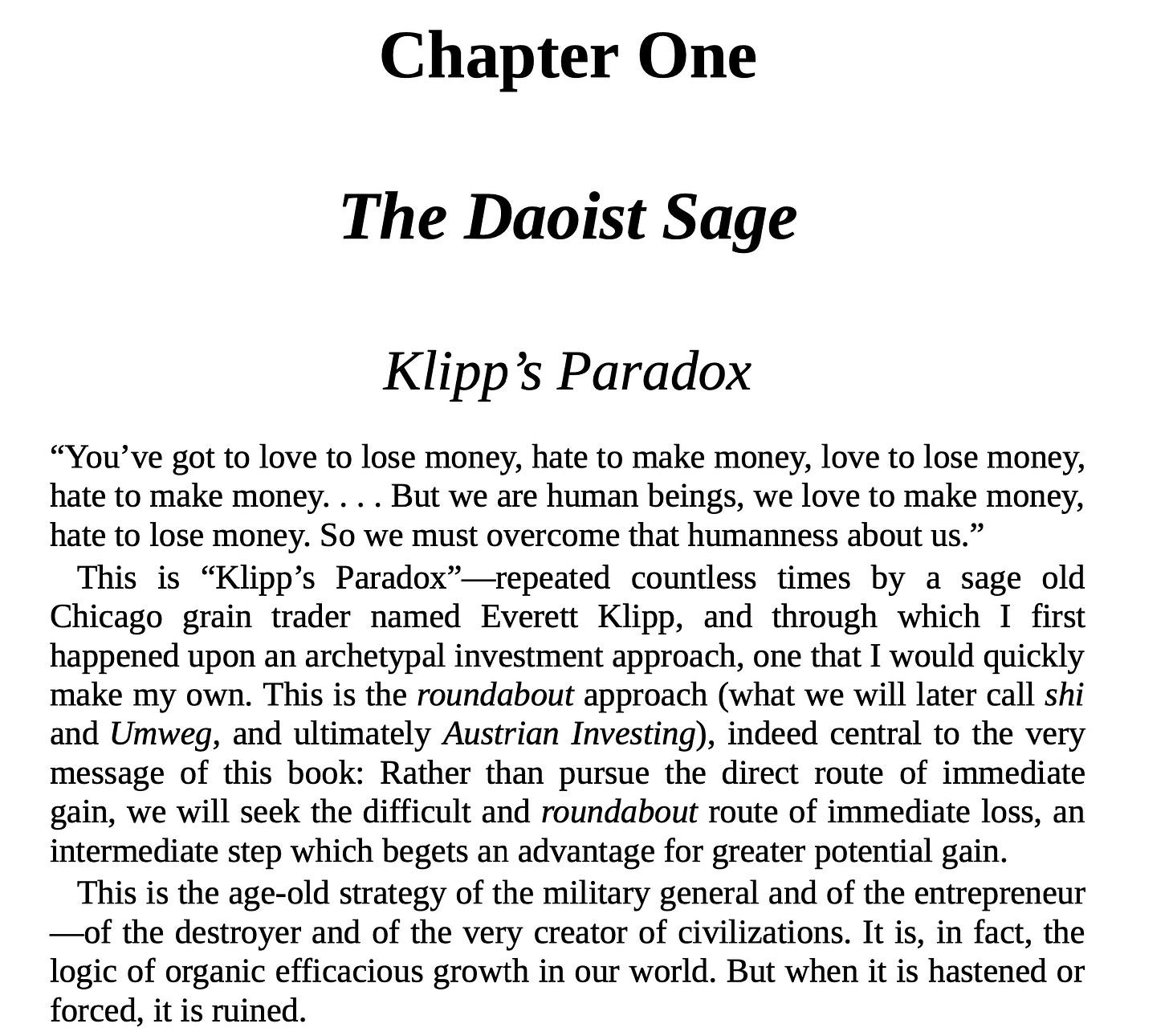These are the opening lines of The Dao of Capital by Marc Spitznagel, founder and owner of Universa investments. In the book, Spitznagel lays out his Austrian investing philosophy, which he calls the roundabout approach, inspired by a similar mindset to that underlying jiu jitsu. The book is full of thought-provoking and (at first) counterintuitive ideas. It’s the kind of book that can’t be “unread”, in that it fundamentally changes the reader’s perception and perspective about a lot of things.
Of everything in the book, the opening paragraphs (copied above) are the most memorable. An earlier post about How Losers Lose discussed the importance of knowing how to lose as a pre-requisite for winning: before we can win, we first have to “stop losing”, and the easiest way to stop losing (or at least lose less) is to stop doing things that losers do.
Klipp’s paradox from the opening excerpt takes this one step further:
Klipp’s Paradox
You’ve got to love to lose money, hate to make money, love to lose money, hate to make money…. But we are human beings, we love to make money, hate to lose money. So we must overcome that humanness about us.
For Klipp, you need to love to lose, because as a trader — especially a trader in a the style of Klipp and Spitznagel — losing is what you spend most of your time doing. At its core, Spitznagel’s roundabout approach boils down to Klipp’s paradox: doing by not doing, avoiding risk in order to take bigger risks, losing as a path to winning.
The quote calls to mind another quote from legendary gambler Nick the Greek Dandalos:
The Greek’s Maxim
The next best thing to gambling and winning is gambling and losing.
Whether applied to trading and gambling, or more generally to life, business, or career, Klipp’s Paradox and The Greek’s Maxim offer the following three key takeaways:
Being in action over the long-term beats winning in the short-term.
The strategy with the highest chance of long-term success also has the highest chance of short-term failure.
The process is the result.
Klipp’s paradox and The Greek’s Maxim offer complementary perspectives on risk, gambling, winning, and losing. Though framed differently, Klipp’s and The Greek’s philosophies coincide on one key point: the importance of being in action. They also differ on one key point: time horizon.
For Nick the Greek it’s about the action, not winning or losing. Win or lose, he’d rather be gambling than doing anything else.
For Everett Klipp, Loving to lose is the mindset necessary to execute a long-term strategy. Klipp’s love of losing is a means to his end goal of winning.
Being in action over the long-term beats winning in the short-term.
Klipp’s love of losing is all about avoiding a big loss on any single trade in the short-run, which he accomplishes by selling at a loss whenever something he buys ticks down in price. By doing this, Klipp knows his maximum exposure before entering a trade, allowing him to avoid big losses, and therefore survive long enough to cash in on the big wins when they do happen. But they happen rarely, so in the meantime he has to love losing.
The strategy with the highest chance of long-term success also has the highest chance of short-term failure.
The Greek only cares about being in action here and now, whereas for Klipp it’s about staying in action for the long term. The longer Klipp can stay in action, the better his chances of surviving long enough to realize the large gains that elude those who go broke too soon. Paradoxically, yet profoundly, in order to have the highest probability of long-term gain, Klipp implements a strategy with the highest probability of short-term loss.
The process is the result.
When the process is the goal in itself, the outcome (winning and losing) becomes irrelevant. Nick the Greek captures this attitude perfectly: in saying that the only thing he prefers to gambling and losing is gambling and winning, he is saying that gambling (win or lose) is the objective.
Once the process becomes the goal, then whatever the process is designed to achieve emerges as a byproduct. For Klipp, the strategy of losing small in the short-term is engineered to win big in the long-term. That outcome will take care of itself, as long as Klipp executes the strategy. But in order to do so, Klipp needs to stay in action (and continue to lose) for a long time.




